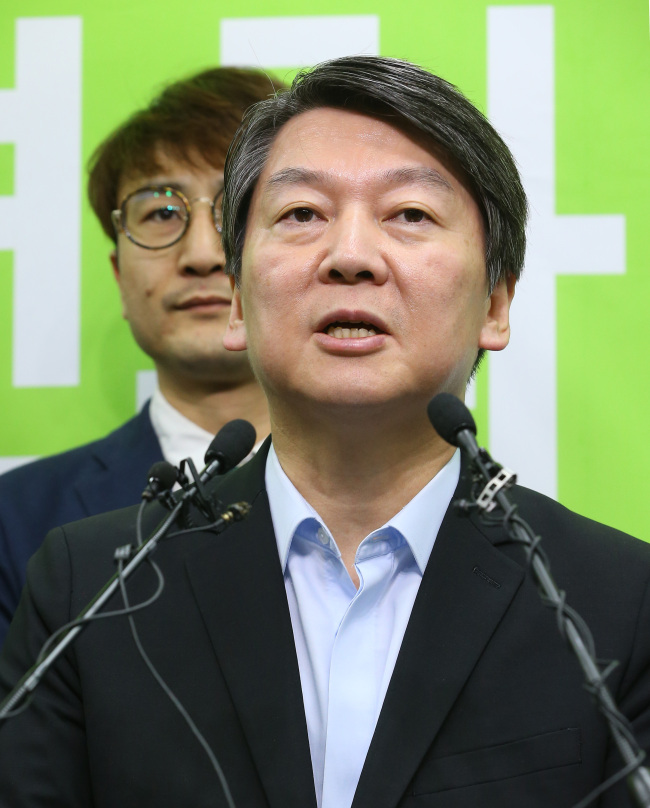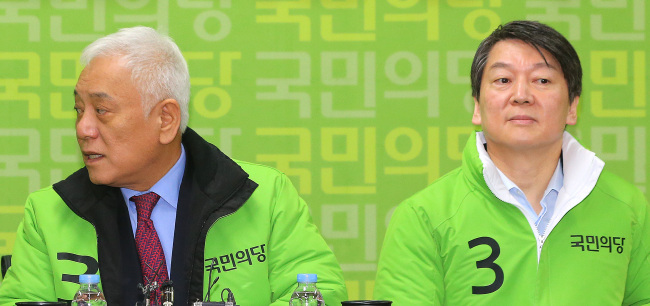Rejecting the main opposition camp’s suggestion for unity, the People’s Party leader Rep. Ahn Cheol-soo chose to pursue his political ideals — safeguarding his newborn centrist party’s independence and promoting diversity in the polarized field.
 |
| Ahn Cheol-soo (Yonhap) |
But the party’s key members lashed back at what they saw as Ahn’s stubborn attitude, claiming that the party should do whatever it takes, including an inter-party merger, to deter the ruling conservative party’s victory in the forthcoming April general elections.
“One of our core tasks is to block the ruling party from taking a decision-making majority in the parliament,” said election policy committee chairman Rep. Kim Han-gil on Monday at an open party meeting.
“Even if we were to constitute a parliamentary negotiating body and gain a say on the (Assembly) floor, it wouldn’t mean anything, should the ruling party win 180 or more seats.”
The ruling Saenuri Party is confident of securing 180 or more out of the 300 parliamentary seats in the April elections, allowing it to pass legislations without consulting minority parties. The current National Assembly Act states that an approval of three-fifth of the lawmakers present is required in order to put a pending bill to floor vote.
Kim thereby took direct aim at party chairman Ahn, who had on the previous day reiterated his flat refusal to The Minjoo Party of Korea counterpart Kim Chong-in’s suggestion to “form an opposition unity for the sake of election victory.”
“There will be no turning back (to the Minjoo camp),” said Ahn, who had defected from the main opposition group late last year amid conflicts with the leadership.
“(I) realize that this could mean death for all, but so be it.”
 |
| Reps. Ahn Cheol-soo (right) and Kim Han-gil, chairman and election policy committee chief of the People’s Party, respectively, sit at a party meeting on Monday. Yonhap |
Ahn’s position may have won sympathy from advocates of the “new politics” slogan but has unnerved the moderates, especially those who defected from the Minjoo Party, including Kim.
“This is when we need to build an integrated resistance system (against the ruling party’s monopoly) as Ahn had suggested,” Kim said, reminding that Ahn himself had brought up the idea of opposition unity as necessary.
Rep. Chun Jung-bae, another high-profile defector from the Minjoo Party, echoed Kim’s assertion.
“Deterring the ruling party’s monopoly is (more) crucial (than the third party independence advocated by Ahn),” the fifth-termer and former justice minister told reporters after the meeting.
Despite the obvious internal strife, however, Ahn refused to back down from his “third way” plan.
“An (opposition) unity is not the key to victory but an outdated strategy that has often led to failure,” the party chairman said, in answer to Kim’s reproach.
“Only by following a new path can we increase the possibility of changing the government and the political system.”
Meanwhile, recent surveys have indicated that the new party’s approval ratings, which had once neared the 20 percent mark, fell to the 5-6 percent range in late February to early March.
By Bae Hyun-jung (tellme@heraldcorp.com)

